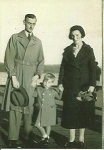Page views : 364
I got to know Willy in 1968 when I was one of his ten history students on the postgraduate teacher training course led by Derek Oldfield at Sussex. I was 21 years old and he was 35. I remember the occasion when he visited me to watch me teach at my teaching practice at a secondary school along the coast at Bexhill-on-Sea.
 He had been unimpressed by the quality of my teaching and told me so. On the second occasion when tasked with the job of making Britain's entry into the Seven Year's War against the French in 1756 interesting to a class if 14 year olds, I gave the lesson in the persona of Prime Minister, Pitt the Elder.
He had been unimpressed by the quality of my teaching and told me so. On the second occasion when tasked with the job of making Britain's entry into the Seven Year's War against the French in 1756 interesting to a class if 14 year olds, I gave the lesson in the persona of Prime Minister, Pitt the Elder. This involved me making a speech justifying the country's entry into the war wearing an approximation of an 18th century coat and hat and my class becoming London electors in Fishmongers' Hall at London Bridge. Willie loved the lesson and when he related his experience at the next weekly meeting of the History group, back on the campus I remember my fellow students almost audibly groaned with his words of : "I want to tell you all that, when I went to see John teach last week, he gave a marvellous lesson in which he 'was' William Pitt."
This involved me making a speech justifying the country's entry into the war wearing an approximation of an 18th century coat and hat and my class becoming London electors in Fishmongers' Hall at London Bridge. Willie loved the lesson and when he related his experience at the next weekly meeting of the History group, back on the campus I remember my fellow students almost audibly groaned with his words of : "I want to tell you all that, when I went to see John teach last week, he gave a marvellous lesson in which he 'was' William Pitt." 
 The second occasion took place at the afternoon drinks and food he provided for us students in the back garden of the house he shared with his wife and three daughters in Lewes. He related, with some relish the occasion when he was reading one of his girls, Catriona, Ailsa or Tara, from the Ladybird book 'Oliver Cromwell' and related with enormous pride and enjoyment the point when she had said "When are they going to cut off the King's head Daddy ?" and he'd replied : "Don't worry Darling. They will. They will."
The second occasion took place at the afternoon drinks and food he provided for us students in the back garden of the house he shared with his wife and three daughters in Lewes. He related, with some relish the occasion when he was reading one of his girls, Catriona, Ailsa or Tara, from the Ladybird book 'Oliver Cromwell' and related with enormous pride and enjoyment the point when she had said "When are they going to cut off the King's head Daddy ?" and he'd replied : "Don't worry Darling. They will. They will." What I didn't know those 50 years ago, was that he was born in 1934 in Harrow, Middlesex, the eldest child of a Hughina, known as 'Hughie' and Hebridean-born, Hector Lamont, who, before 'Billy' was born, had moved to London to take up the job of a bank clerk, but had been a purser on the MacBrayne Ferries serving Scotland’s West Coast who had got engaged to Hughina on the Oran Ferry.
What I didn't know those 50 years ago, was that he was born in 1934 in Harrow, Middlesex, the eldest child of a Hughina, known as 'Hughie' and Hebridean-born, Hector Lamont, who, before 'Billy' was born, had moved to London to take up the job of a bank clerk, but had been a purser on the MacBrayne Ferries serving Scotland’s West Coast who had got engaged to Hughina on the Oran Ferry. Willie was five years old when the Second World War broke out and attended Priestmead Primary School, interrupted by wartime evacuation to Oban in 1941 and then, having passed his 11+ went on to Harrow Weald Grammar School with its 'Valiant for Truth' motto.
Willie was five years old when the Second World War broke out and attended Priestmead Primary School, interrupted by wartime evacuation to Oban in 1941 and then, having passed his 11+ went on to Harrow Weald Grammar School with its 'Valiant for Truth' motto. In 1952, at the age of 18, he started life as a History undergraduate at Queen Mary College, University of London. Subsequently, he supported his study for his doctorate with research at the Institute of Historical Research, by teaching at the boys public school, St Paul’s School and then for three years at the grammar school for boys, Hackney Downs.
In 1952, at the age of 18, he started life as a History undergraduate at Queen Mary College, University of London. Subsequently, he supported his study for his doctorate with research at the Institute of Historical Research, by teaching at the boys public school, St Paul’s School and then for three years at the grammar school for boys, Hackney Downs. His thesis topic was the unattractive and combative, seventeenth century Puritan lawyer and polemicist, William Prynne which he published in 1963 and recalled, twenty years later : 'A criticism of my study, and of other revisionist works, is that we are better-informed, as a result, about why the Civil War did not happen at any period before 1642, than about why it did happen in 1642.' He also recorded 'Prynne and his colleagues can now be shown convincingly, not as Bakunin-type fanatics planning some ‘revolution of the saints’ when the Long Parliament convened in November 1640, but as angry and confused conservatives, seeking to restore an idyllic Elizabethan past.'
His thesis topic was the unattractive and combative, seventeenth century Puritan lawyer and polemicist, William Prynne which he published in 1963 and recalled, twenty years later : 'A criticism of my study, and of other revisionist works, is that we are better-informed, as a result, about why the Civil War did not happen at any period before 1642, than about why it did happen in 1642.' He also recorded 'Prynne and his colleagues can now be shown convincingly, not as Bakunin-type fanatics planning some ‘revolution of the saints’ when the Long Parliament convened in November 1640, but as angry and confused conservatives, seeking to restore an idyllic Elizabethan past.'In his acknowledgements he said : 'My debt is overwhelming to Professor S. T. Bindoff, who first encouraged me to research, and to Mr. R. C. Latham, who first suggested the subject and who supervised my researches. My mother typed the first draft, and my wife and my father aided me in the correction of proofs and in the compilation of an Index. I should like to thank History Today for their help in providing photographs. During the last three years at Hackney Downs Grammar School, William Prynne was dragged into many lessons--though never by the ears. This book is offered as an act of contrition.'
 By the time 'Marginal Prynne' was published in 1963 Willie had married Linda, taken up a lectureship in history at the Aberdeen College of Education, contracted tuberculosis and was recovered sufficiently to play in the snow with Ailsa in the big winter of that year.
By the time 'Marginal Prynne' was published in 1963 Willie had married Linda, taken up a lectureship in history at the Aberdeen College of Education, contracted tuberculosis and was recovered sufficiently to play in the snow with Ailsa in the big winter of that year.
Though proud of his Scottish antecedents, in 1966 he was tempted south of the border by the offer of a lectureship at the new University of Sussex.
 He later recalled : "Well the first exhilarating thing for me really was, I'd been in Aberdeen and I'd got out of the blue, before I came to Sussex a communication from a Sybil Oldfield, who was a lecturer in English. And she'd picked up on the grapevine that there was a seventeenth century historian coming. So she said she had the idea of starting a course on 'English Literature and the Civil War' and then we corresponded and we'd never met and this to me was astonishing. Astonishing that somebody should just approach me. I mean, she knew I was going to come in the summer and was already planning and we discussed things, but we still hadn't met. And the thing I couldn't get my head around was that I'd been a student at the University of London where they change the syllabus about once every two hundred years or something and here it was : "Let's start a course.""
He later recalled : "Well the first exhilarating thing for me really was, I'd been in Aberdeen and I'd got out of the blue, before I came to Sussex a communication from a Sybil Oldfield, who was a lecturer in English. And she'd picked up on the grapevine that there was a seventeenth century historian coming. So she said she had the idea of starting a course on 'English Literature and the Civil War' and then we corresponded and we'd never met and this to me was astonishing. Astonishing that somebody should just approach me. I mean, she knew I was going to come in the summer and was already planning and we discussed things, but we still hadn't met. And the thing I couldn't get my head around was that I'd been a student at the University of London where they change the syllabus about once every two hundred years or something and here it was : "Let's start a course.""https://willielamont.home.blog/recordings/
Sussex was one of the most successful of the 'Robbins Universities' established as university system expanded in the 1960's and was he tailor-made for its cross-curricular approach and commitment to teaching and research.

It was in 1966 that Willie saw 'Sir Edward Dering : The Squire Who Changed Sides' published in 'History Today'. It was typical of Willie that he would choose to research the complex Dering, the Kentish Squire who introduced the 'Root and Branch Bill' in 1641, which sought to sweep away the existing church hierarchy with its roots and branches, only to later change his mind and fight for King Charles and the Established Church saying of his opponents “Whilst they are floating, I stand steady, wondering to what coast they are bound.”
Three years later in 1969 he published 'Godly Rule: Politics and Religion, 1603-60' which centred on the profound effect that the Elizabethan John Foxe, historian and martyrologist and author of 'Actes and Monuments' which emphasised the sufferings of English Protestants from the 14th century through the reign of Mary I, had on seventeenth century Puritans. Giving them an eschatological faith based on the Book of Revelation which included a messianic conception of England's role with Elizabeth I and her successors play the role of Constantine.
There was more than a touch of the seventeenth century radical about Willie : the enemy of bureaucracy in higher education and energetic proponent of keeping the academy’s doors open to all-comers, in what today would be called 'outreach'. At first, at Sussex, he held a joint post in History and Education, developing the University’s Bachelor of Education degree and setting up a close relationship with local schools. He was also fiercely committed to adult education. When the School of Education was founded, Willie then moved full time into the History Subject Group.
 In 1979 Willie co-authored as an audio book 'Charles I and Puritanism' with G.E. Aylmer and three years later came 'Richard Baxter and the Millennium: Protestant Imperialism and the English Revolution.' His study of Baxter, the prolific theological writer, who after the Restoration of the monarchy in 1660, became one of the most influential leaders of the Nonconformists, spending time in prison, revealed Willie's mastery of Baxter's published works and unpublished treatises and correspondence. In Baxter, he found a protestant cleric constantly refining his position, sometimes radically in that time of political and social turmoil.
In 1979 Willie co-authored as an audio book 'Charles I and Puritanism' with G.E. Aylmer and three years later came 'Richard Baxter and the Millennium: Protestant Imperialism and the English Revolution.' His study of Baxter, the prolific theological writer, who after the Restoration of the monarchy in 1660, became one of the most influential leaders of the Nonconformists, spending time in prison, revealed Willie's mastery of Baxter's published works and unpublished treatises and correspondence. In Baxter, he found a protestant cleric constantly refining his position, sometimes radically in that time of political and social turmoil.He returned to Baxter in 1994 when he edited, in 'Cambridge Texts in the History of Political Thought : 'Baxter: A Holy Commonwealth.' Willie focused the most controversial of all his works, written in 1659, which he publicly repudiated it in 1670, and in 1683 the Oxford University authorities ordered it to be part of a book-burning that included the works of Hobbes and Milton. Willie's edition of 'A Holy Commonwealth' made available to modern readers a work which offered a unique perspective on the relation between church and magistrate and the origins of the English Civil War.
 In 1996, his 'Puritanism And Historical Controversy' had its origins in an undergraduate course which aimed to introduce students to the nature of historical debate by grounding the historical debates surrounding Puritanism in the experiences of three representative Puritans, Willie's old friends : Prynne, Baxter who were joined by Lodowicke Muggleton. In this way he was to challenge common stereotypes and orthodoxies and illuminate key issues surrounding the influence of Puritanism on early modern England.
In 1996, his 'Puritanism And Historical Controversy' had its origins in an undergraduate course which aimed to introduce students to the nature of historical debate by grounding the historical debates surrounding Puritanism in the experiences of three representative Puritans, Willie's old friends : Prynne, Baxter who were joined by Lodowicke Muggleton. In this way he was to challenge common stereotypes and orthodoxies and illuminate key issues surrounding the influence of Puritanism on early modern England.Two years later and almost at the end of his career at Sussex, came his book of essays by his Sussex colleagues : 'Historical Controversies and Historians'. Concentrating on the 'practice' of history it examined a number of notable controversies that have been, and still are, the subject of historical debate : race in South Africa, the legacy of the French Resistance, the origins of the Welfare State. These illustrated the issues involved in "doing" history. In the second half he focused on the historians themselves : Tawney, Carr, Buckhardt, Weber, Thompson and demonstrated how the historian puts his/her own spin on historical interpretation.
It was entirely appropriate that on the occasion of his retirement from Sussex in 1999 his colleagues presented him with :
 Over the next six years the pair attracted a small but dedicated band of followers that, following the death of Reeve, became known as the Muggletonians. Willie followed their story from the heady post-civil war days through to the death of their last member, Philip Noakes, in 1979.
Over the next six years the pair attracted a small but dedicated band of followers that, following the death of Reeve, became known as the Muggletonians. Willie followed their story from the heady post-civil war days through to the death of their last member, Philip Noakes, in 1979.

Willie's was a story of how a small religious group, which eschewed active proselytising and believed in the mortality of the soul, managed to overcome persecution and obscurity, to survive for 320 years. He visited Jean, the widow of Philip Noakes, in her Kentish farmhouse to inspect the only known portrait of Lodowicke Muggleton : https://www.youtube.com/watch?v=O8rals1tgVM&t=1m03s He also took over the Muggletonian archive which had been discovered at the home of Philip Noakes by E.P.Thompson : https://www.youtube.com/watch?v=O8rals1tgVM&t=12m03s
It was also entirely appropriate that on one of the last occasions spoke in public, before the curtains of dementia closed around him, was at a meeting of the Lewes branch of U3A in 2013. His subject : radicalism to the last ! The programme read :
'Professor William Lamont : The Diggers in the English Revolution.'
“Study hard, for the well is deep, and our brains are shallow.”
― Richard Baxter, The Reformed Pastor









No comments:
Post a Comment